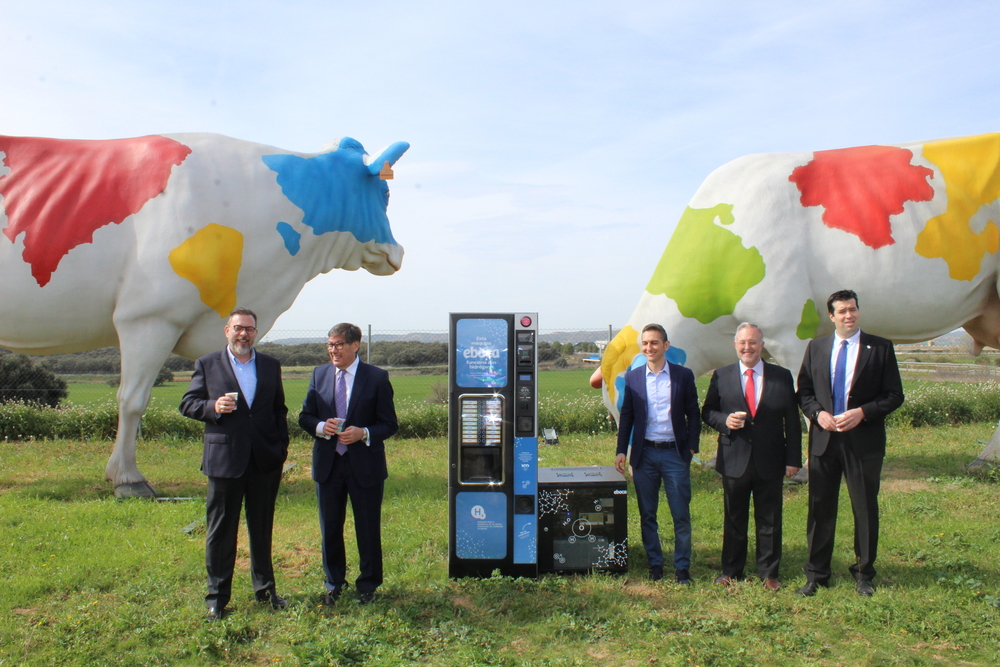Eboca and the Aragon Hydrogen Foundation develop a hydrogen-powered coffee machine
Both organizations have carried out a pilot Project in Ordesa National Park to help curb climate change by using alternative energy methods such as hydrogen.
Last December, the Aragonese vending machine company Eboca and the Foundation for the Development of New Hydrogen Technologies in Aragon carried out a pilot Project that consisted of installing an automatic coffee machine in the Ordesa meadow that operated with hydrogen as its sole power source, without the need for connection to the conventional electricity grid.
The project is the result of Eboca’s efforts in innovation to find new formulas for obtaining energy and reducing the carbon footprint of its business activity, in this case with the support of the Aragon Hydrogen Foundation, who is celebrating its 15th anniversary. Both organisations are sponsors of the Centenary of Ordesa and Monteperdido National Park, which is why this emblematic natural space was chosen to carry out the initiative. It allowed visitors who came to Ordesa to have a coffee from the Eboca company using a vending machine connected to a fuel cell that uses hydrogen energy to produce the electrical current it needs to operate.
The machine has been presented today at Eboca’s facilities in Huesca, in an event attended by the Vice-President and Minister of Industry, Competitiveness and Business Development of the Government of Aragon, Arturo Aliaga, accompanied by the Director General of Industry, Javier Navarro; the Managing Director of the Aragonese Hydrogen Foundation, Fernando Palacín; and the President of Eboca, Raúl Benito.
Hydrogen: electric energy where it is needed without polluting emissions
The supply of electricity in places where there is no point of connection to the electrical grid has long been served by combustion generators, a mature technology of proven efficiency and affordable costs. However, as they are dependent on fossil fuels, they are subject to cost variations and generate polluting emissions, which forces the search for alternatives in line with global objectives for reducing CO2 emissions. In fixed installations of low and medium power, the use of renewable energies such as solar or wind combined with energy storage in batteries is a competitive solution, but when an electric generator is needed for an event, a temporary supply or an emergency, combustion generators are the recurrent solution.
The advance of hydrogen technologies has made it possible to replace them with others based on hydrogen fuel cells, whose main feature is the total absence of contaminating emissions and noise, making them ideal for confined spaces, natural areas or crowded places.
To this end, the Aragon Hydrogen Foundation has designed a 1 kilowatt (kW) power generation system, which is the one used in this case and which allows the full potential of this technology to be shown. The equipment uses a Nexa 1200 fuel cell powered by hydrogen from a cylinder and oxygen from the surrounding air. The chemical reaction inside the cell generates a direct current electrical power that, through a converter and an inverter, is converted into an alternating current, with similar characteristics to the one that reaches our homes, and which can power any electrical appliance like the Eboca coffee machine.
The equipment uses a small 24-volt battery bank that fulfils three functions: to provide energy to the equipment during start-up, to store energy during operation and to provide power to the system during demand peaks, which allows the battery to provide up to 1.2 kW of power occasionally, during several seconds.
This collaboration between Eboca and the Aragon Hydrogen Foundation highlights the usefulness of hydrogen as a clean energy vector, since the onlye waste generated by its use is water. It poses a real solution for environments that are not very accessible and highly sensitive, such as natural areas or mountain refuges, where the Foundation is already carrying out European cooperation projects such as LIFE Sustainhuts.



